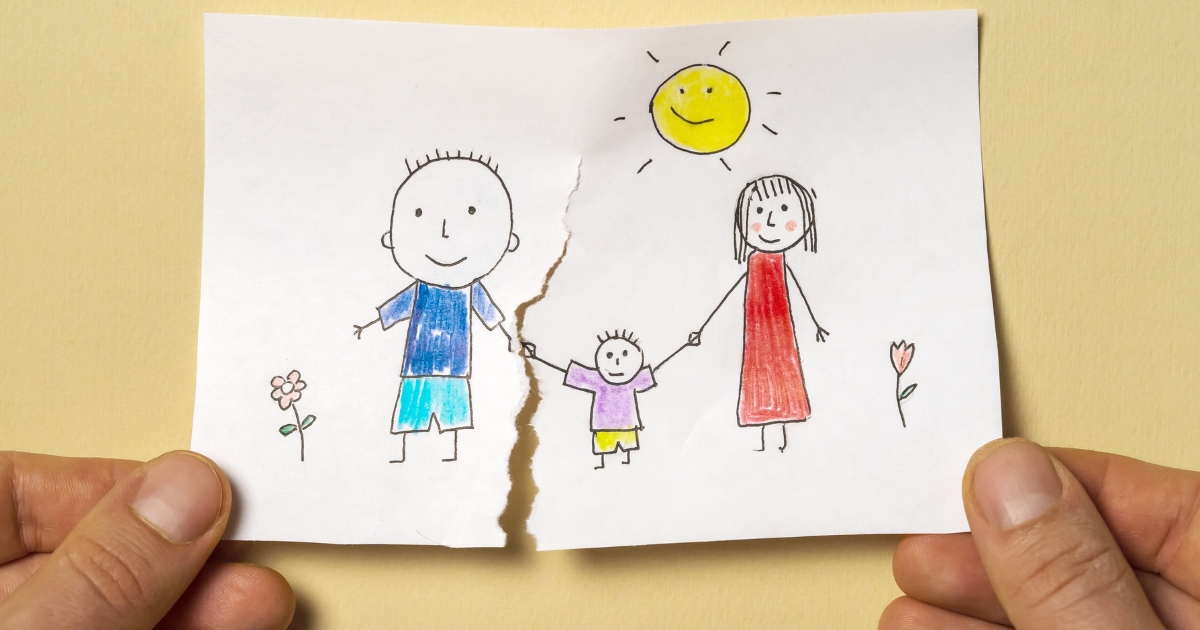Divorce is one of the toughest things a person can go through. It touches the lives of everyone involved and can be incredibly damaging when the divorce becomes particularly contentious. If you have children, there’s a good chance that you’re concerned about their well-being both during and after your divorce.
Making sure that your children make it through a divorce as unscathed as possible is one of the most important tasks you can undertake during divorce. They’re likely to have feelings of sadness, anger, or confusion – or they may even wonder if the divorce occurred due to something that they’ve done. The way that you handle the situation will be an important part of how they interact with the world as they grow older, so we’ve assembled a brief guide to helping your children through your divorce.
How To Tell Your Kids About Your Divorce

Preparing kids for divorce is one of the most critical components of helping them navigate life during and after this significant change. Start by carefully planning what and how you will tell them about the divorce.
Consider the Who and Where
You may choose to have the conversation with just one parent in the lead, but it’s important that the parents present a united front. Also, think about when you may want this conversation to take place. Ideally, you’ll have the conversation during a quiet time of day when your children are fairly comfortable, like after dinner, in a cozy location like the living room. No matter how it’s done, it should take place in a comfortable and calm environment so that if there are questions, your children will feel safe asking them.
Make Sure Your Children Know They’re Loved
This cannot be overstated. Reassuring your children that they’re loved is probably the most important thing you can do for them as you begin the divorce process. They need to know that both parents love them and that this love hasn’t changed in the same way your love for one another may have. They also need to know that they’ll still be able to see both parents and that more details will be forthcoming as you proceed.
Make Sure They Know They Didn’t Cause the Divorce
Too many children of divorce grow up feeling as though something that they have done caused the divorce. Your children need to know that they’re not the cause and that the relationship between their parents is the only thing that has changed. Nothing the children can do would trigger or change the decision, and divorce is the final step.
Ask Your Children How They’re Feeling
During the initial conversation, it’s important to ensure that your children can ask questions and talk about their feelings if they want. However, those feelings and their willingness to share them may change once or many times during a divorce, so it’s important to follow up again later. Make sure that they know they can always express how they’re feeling about the situation.
Additionally, it’s vital that you’re honest when answering questions. While it may be hard to answer some of their questions, and you may choose not to tell them certain details, do be as honest as you can.
Be Honest, but Don’t Tell All
As was indicated in the prior tip, there are certain details that your children likely will not need to know about the troubles you and your partner have experienced. You certainly don’t want to provide details that may make children feel as if they need to choose between their parents. Arguments or discussions that are adult should stay between the adults in the situation.
Consider Outside or Professional Help
Your children might not feel completely comfortable talking to you about the situation, and that’s okay. Make sure they have someone they can talk to, whether that be a counselor, a social worker, or a trusted family member.
Children and Divorce: How You Can Make the Change Easier for Your Children

For children, the transition to a new situation or home can be the roughest part of a divorce. Doing what you can to make the changes easier on your children will help them have a less stressful experience. If you and your partner can both dedicate yourselves to helping your children cope with separation, they can and will adjust to the new situation.
Here are some things you can do and say that might make this time easier for your children:
Try to Create a Parenting Plan Early On
If you can already have your parenting time arrangement (parenting plan) organized before talking to your children, it will help them experience less uncertainty. Then, you can have an open discussion about the changes to their living arrangements that will be happening. Make sure your children know that the decisions being made are in their best interests. If you have older children, you may want to consider the input they may have about their desired living arrangements.
Try to Keep to Routines
Change is hard. While children can be very adaptable, it’s important that during a time when there are going to be a lot of changes, any routines stay as consistent as possible to help them feel at ease – not everything is changing. For example, if your children play sports or have other extracurricular activities, it’s important they get to stick to those things with as few changes as possible.
Focus on Quality Time
While divorce can be stressful and time-consuming, make sure you’re still spending quality time with your children as much as possible. Staying connected with both parents during times of change can help children feel grounded and secure. If you have more than one child, be sure that you’re spending time with all of your children together and separately – just make sure you’re dividing your time equally.
Reduce Negativity in Front of Your Children
Make sure that you’re not having negative conversations with others in front of your children – especially about their other parent. Divorce is incredibly difficult, and it can certainly be frustrating, but airing your hard feelings with trusted friends and family or a professional out of the earshot of children is vital. If your children hear these negative things, it may influence how they feel about the other parent, and that’s not fair for them or the parent. Additionally, ensure that you and the other parent are respectful to each other when communicating.
Be Open and Kind
Make sure that you’re kind and polite to your child’s other parent in the presence of your children. Additionally, make sure that your children have access to the other parent whenever they need them. If they want to call their other parent, it should be simple to grant that request. If you have boundaries set with the other parent, be sure to respect theirs as well. It shows your children an important level of maturity.
How To Recognize Your Children Are Having a Difficult Time

It may be hard to determine whether your children are having a difficult time with the divorce. There are, of course, obvious signs, but there are other things that might not be so obvious. Older children are notorious for putting a brave face on for their parents, and because divorcing parents are often caught up in their own stress, they may not recognize that of their children. Just because you don’t recognize your children’s stress easily, though, doesn’t mean it’s not there.
Here are some common signs your children are more stressed than they let on:
- Bedwetting is a common sign of distress in children, including during shifts in family dynamics or living arrangements.
- Disturbed sleep patterns can also be an indicator of a child having a difficult time processing the divorce.
- New difficulties at school can be another indicator a child is struggling to adjust to the divorce. Look for things like fights, tantrums at school, or falling grades.
- If your children start to lose interest in the things that they once loved to do, this may be another sign that they’re having difficulty adjusting.
- Increased reactivity in the form of anger or crying can be another indicator the child is having a difficult time adjusting to the divorce.
If you notice any of these signs, your child will almost certainly need more love, support, and comfort from both parents. They also may need additional support from a professional.
How Does the Court Determine Custody?

Decision-making rights, parenting time, and child support payments are some of the most contentious parts of any divorce – and they’re the components that most affect the children involved. Unfortunately, negotiations can get heated, and it can be difficult for two parties to come to an agreement on these decisions. If the two parties cannot work together to create a judge-approved parenting plan that arranges parenting time, decision-making rights, and child support, the court will step in to do so.
There are a few factors the family court will consider when making this determination. First, the judge will consider the current, past, and future relationship between the children and each parent. Then, they will consider the children’s attachments to the community, school, and residence. If uprooting them will cause too much stress and turmoil, a judge may not approve of moving them from their current home or community.
A judge will also consider whether the planned situation will allow the children to continue fostering a relationship with both parents as long as the relationships are not dangerous. Any record of domestic abuse, child abuse, or sexual assault will factor heavily into the court’s decision. Finally, a judge will consider whether either party has attempted to manipulate the court system or mislead them in any way.
One common misconception is that the court must consider the children’s preferences. This isn’t always the case. The goal of the court is to make a decision based on the best interest of the children, and that might not always be the children’s preference. However, a child mature enough to express a reasonable opinion may be considered by a judge.
How Can an Arizona Family Law Attorney Help?
Managing a divorce is difficult enough on your own, but it becomes exponentially more complicated when you have children. However, with the support of a skilled family lawyer, your divorce can proceed as smoothly as possible. This can potentially reduce the stress and burden on both yourself and your children.
Additionally, an attorney can help you present the evidence and arguments needed to ensure a parenting plan and child support arrangement that benefits both you and your children. With an attorney by your side, you’ll have the resources you need to ensure a successful, timely divorce. This Arizona divorce guide can help answer some questions you might have right away.
The Valley Law Group – Your AZ Divorce Attorney

We understand how important your children are to you, which is why we know how crucial it is for your divorce proceedings to go quickly and with as little negative impact on you and your children as possible. The Valley Law Group has years of experience with the Arizona Family Court system, and we recognize the importance of a strategy that is fully customized to your needs.
Let our skilled family law attorneys take care of your divorce proceedings so that you can focus on preparing your kids for divorce. The end result can be a happy, healthy family ready to take on the challenges and advantages of a new life after the end of the marital tensions that brought you here.
If you’re ready to file for divorce in Arizona, contact The Valley Law Group and let us advocate for you and your children.
References :
- Visser, M. M., Telman, M. D., de Schipper, J. C., Lamers-Winkelman, F., Finkenauer, C., & Schuengel, C. (2016). Children’s Mental Health Problems Following Parental Separation: The Impact of Parental Alienation. Journal of Child & Family Studies, 25(10), 3199–3207. Retrieved from https://academic.oup.com/jpepsy/article/41/9/1002/2222543
- Canadian Paediatric Society. (n.d.). Separation and divorce: How it affects your child. Retrieved from https://caringforkids.cps.ca/handouts/mentalhealth/separation_and_divorce
- DivorceNet. (n.d.). Arizona Child Custody Laws. Retrieved from https://www.divorcenet.com/resources/arizona-child-custody-laws.html#:~:text=The%20court%20can%20award%20joint

Jonathan Roeder, Founder/Director of Marketing of The Valley Law Group, is an Arizona native who has dedicated his life and career to the service of others. After graduating salutatorian of his high school class, Jonathan attended beautiful and prestigious Pepperdine University, where he majored in Political Science. During his tenure at Pepperdine University, his passion for helping others grew after securing a clinical position with a residential treatment center for juveniles with substance addictions. Post-graduation, Jonathan returned to Arizona and served as a residential manager for mentally and physically disabled homes.

